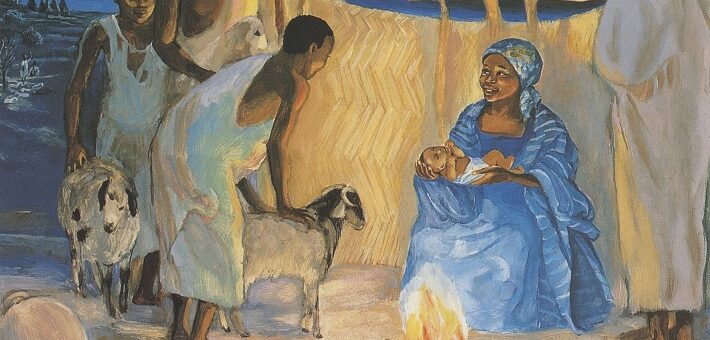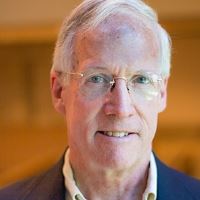Commentary on Luke 2:1-14 [15-20]
From Luke’s theological-narrative point of view, Luke 2:1-20 is a single unit.
The lectionary divides the text into two parts — one for Nativity of Jesus: Proper 1 (Christmas Day 1) (Luke 2:1-14 [15-20]) and one for the Nativity of Jesus: Proper 2 (Christmas Day 2) (Luke 2: 1-7 [8-20]). In a congregation that has a service on Christmas Eve but not Christmas Day, the preacher could deal with the whole of Luke 2:1-20.
If a congregation has distinct services that on Christmas Eve and Christmas Day, the preacher could emphasize the lectionary texts for each service. The preacher might leave the congregation hanging at the end of the Christmas Eve sermon with the promise of resolution on Christmas Day. Or in the case of two services the preacher could start with Luke 2:1-20 and pick up different emphases in the same text for two quite different sermons.
Multiple dynamics are at work in the Christmas listening community. Many people bring a Norman Rockwell perspective to Christmas services, especially around family. One of my childhood friends describes Christmas Eve as “magic.”
However some folk are in worship to get parents off their backs. Resentment is their middle name. Others come confused or in grief. What to do when income is small and debt large? How to move forward after divorce? Still others struggle with racism, poverty, social inequity, and ecological crisis.
The reading from Luke offers a preacher a starting point for interpreting the divine presence and purposes in ways that are appropriate to the season and to the different places from which people enter the sermon. Some folk need assurance more than they need to be challenged. Others need to think beyond the glow of children singing in robes in candlelight to children who are hungry, exploited, homeless, and violated.
Some Christians continue an older view that the references in Luke 2:1-8 to the Emperor (Caesar) Augustus, Quirinius and the registration, indicate Luke’s interest as an historian. In this view, Luke locates the story of Jesus at a specific moment in history, perhaps to stress the veracity of the story.
Over the last generation, however, many scholars have come to regard Luke less as an historian simply recording facts and more as a theological interpreter who seeks to persuade readers that through Jesus, God signals the beginning of a process to end the present evil age and replace it with the realm of God. The former is a time idolatry, Satan, demons, injustice, exploitation, oppression, slavery, sickness, violence, and death, whereas the latter is a new world of true worship, justice, mutual support, freedom, health, and eternal life.
The Roman imperial system was one of the dominating realities of the Mediterranean world. From Luke’s point of view, Rome epitomized much of the brokenness of the old age, especially its idolatry, exploitation, oppression, and violence.
The references to the Emperor Augustus, to Quirinius, and to the registration call to the listener’s mind the brokenness of the present world. Luke does not say directly, “I want you to compare the values and behaviors of the old age — especially as represented by Rome — with those God, Jesus, and the realm of God, and to want to be part of the movement towards the latter.”
Luke uses the details of 2:1-7 to prompt the listener to compare and contrast the values, practices, and methods of the realm with those of Rome, and to want to choose the former. The dream comes about by radically different means than Roman rule. Whereas Rome operates through “shock and awe,” brute power, God works through understated means. The story alerts listeners to look for how God continues to work through such means in their (our) worlds.
The “registration” symbolizes life in the Roman Empire. The registration refers to Rome enrolling residents for the purpose of taxation. In a bitter irony, by paying taxes to Rome, the residents of Judea, Samaria, and Galilee would pay for the oppression and violence visited upon them by Rome. A preacher might help the congregation identity similar realities in our world.
Whereas in the upper levels of the Roman imperial world, the birth of a (potentially) significant person was often heralded with great fanfare, the birth of Jesus takes place in an ordinary house in an ordinary town. Jesus was born not in Rome or Jerusalem, but Bethlehem, a modest community. These details signify the nature of the renewal taking place in out of the way places. The birth and ministry of Jesus begin outside the formal power structures of Rome and Jerusalem, thus prompting the listener to look for people, ideas, groups, and movements in out-of-the-way places that point to the values and practices of the realm.
Being pregnant without the benefit of a finalized marriage left Mary and Joseph in an awkward position. The preacher might help the congregation name individuals and communities in awkward circumstances today but through whom God works.
When Luke says, “There was no place for them in the inn,” ancient listeners would hear more than, “All the hotel rooms were full.” Luke recollects a space that could be rented to guests in many houses. Such houses were small and often designed for animals on the lower level and people on the upper level. So many people were in Bethlehem for the registration (so vast was the extent of Rome’s oppressive power) that the feeding-trough (manger) on the first floor was the last space in such a house for infant Jesus. Preachers often raise the question, “Is there room in your inn (or guest room) for Jesus?” A more fruitful question might be, “How can we — and our world — make room for the Jesus and the realm?”
Luke 2:1-8, then, offers both assurance and invitation (challenge). It assures us that God is already at work to remake the world as a realm of blessing for all through Jesus and it prompts us to look for unlikely means through whom God may be present. The passage invites we who wrap ourselves blankets of comfortable familiarity that seldom looks beyond our own families or welfare to enlarge our vision of God’s purposes, and to join God in the movement to a renewed world.


December 24, 2015